The interview is the most important stage of hiring. In order to successfully pass it, the applicant needs to prepare and think in advance what to talk about with the future employer in person, and what should be avoided.
General rules of communication
To communicate correctly in a meeting with a potential employer, it is necessary not only to soundly voice questions and answers, but also to adhere to generally accepted norms of behavior.
- Only truth should be spoken at the interview, since false information can be verified quite easily, and this obviously will not be beneficial to the applicant. In addition, in large firms, the security service often independently creates dossiers for each potential employee, and truthful information can already be posted in it. The speech should be competent, but focused on the scope of the company and the identity of the recruiter. For example, talking with dry clerical phrases would be inappropriate at a meeting with the head of an advertising agency for 25 years.
- Better prepare for productive communication. - to think over answers to possible non-standard questions, and also to prescribe a number of points of interest in advance. At the interview itself, one should always speak on the topic, without being distracted by stories from the lives of relatives or discussions about the political situation in the country. It is important to try to avoid parasitic words to the maximum and, of course, completely eliminate profanity. During the dialogue, one should not show any aggression or disrespectfully answer a question with a question. Complaints about one's well-being or any attempt to arouse pity will be inappropriate.
- It is believed that recruiters are well aware of the use of strong words and perfect verbs. During the interview, you must try to insert the words “done”, “achieved”, “developed”, “completed”, etc. A large number of such verbs as “adjusted”, “did”, “researched” can create an impression of the interlocutor as a person who does not bring anything to the final result. Confidence and clarity must be heard in the voice throughout the conversation.
- Self-presentation can rightly be called the most important part of the interview, therefore, it is necessary to prepare for it in advance. Ideally, it lasts from 2 to 3 minutes, and during this time all important and significant aspects of the professional activity of the applicant are covered.

The next block is already devoted to the recruiter's questions - both standard and non-standard, and the whole conversation ends with questions of the potential employee.
What to ask the employer?
As a rule, after interviewing the applicant, the employer invites you to ask your questions. At this point, you should definitely find out about the salary and working conditions.
The salary
The question of wages cannot be discussed in the first place, but after the applicant has presented himself in a quality manner, it will be quite appropriate to find out all the financial details. Moreover, if you are disinterested in remuneration, you can show yourself as a layman and a person who does not give a damn about the sphere of activity, or about yourself. In the case when the recruiter is interested in how much the applicant would like to receive, the latter should be guided by the average value of salaries in the labor market in this area.
Mention at the moment of any part-time or third-party income, of course, should not be.
Working conditions
It is equally important to check with the recruiter and working conditions. You can start with the question of the direct responsibilities and activities of the department in which you have to work. It will be useful to find out who will become the immediate boss, how many people work in the department. Be sure to clarify the issue of possible business trips and the likelihood of overtime processing. It would be nice to immediately clarify the duration of the trial period, work schedule and vacation regime. Other relevant questions include corporate transport and a dress code.
Personal issues should be avoided, for example, regarding the presence of single men in a company. You should not ask about elementary things that the applicant must know about, for example, what the company does at all.


What to tell about yourself?
When asked to talk about themselves at an interview, of course, we are talking about professional activities and the successes achieved in it, and not about any personal details. However, verbatim duplication of personal data specified in the resume does not make much sense. Be sure to present to the interviewer your achievements, qualifications and experience. The phrases revealing the most powerful aspects, for example, attentiveness to details, the ability to work effectively as a team and alone, will also be useful, responsibility and perseverance. It is important to build your presentation in such a way as to clearly demonstrate your advantages over other competitors claiming the same position.
It is important to remember that the main purpose of the story about yourself is for the recruiter to see a direct connection between the education and the experience of the candidate with the position that he expects. Thus, the emphasis will have to be done precisely on those achievements that are somehow related to the requirements of the current position.
If the applicant is asked to talk about their shortcomings, it is important to choose the words in such a way as to present them in a positive way. For example, to tell that excessive perfectionism sometimes leads to a violation of the deadlines, but only because of the desire to do the job as efficiently as possible.The story of how a certain flaw led to the mistake made will be useful, but it, in turn, allowed us to get a valuable lesson and this will not happen again.
Most likely, at the interview there will be a conversation about why a person quit his old job. Of course, the truth must be said about this, but not by "tarnishing" the previous place of employment and its representatives, but by maintaining neutrality.


Very often, the recruiter tries to find out the motivation of the applicant, encouraging him to work in a particular company. In this case, you can talk about professional interest in this place of work, having previously familiarized yourself with its activities. It will be useful to tell about your desire to participate in projects implemented by the company. It’s great if you mention inspiration from the process of work itself, the path to achieving a goal or team work. It should not be reported that the main motivation is money.
If a recruiter asks some strange question, which leads to a dead end, then you should not worry, refuse an answer or show your discouragement. You can always debate and demonstrate, if not specific knowledge, then the ability to reflect or be creative in solving a problem. If the interlocutor asks about probable other job offers, then one can mention their existence, but emphasize that this company and position attract most of all.
When asked about the marital status, as well as the family as an obstacle to work, experts recommend answering that earlier these two spheres of life were combined without problems and will continue to be so in the future.

What is better to be silent about?
When applying for a job, you cannot mention that this vacancy is the only chance to somehow establish your own life. Especially you should not focus on future salaries and the opportunities that will open with their receipt. The employer may think that the applicant is not going to invest and act in accordance with the interests of the company, but only wants to receive financial rewards.
It is important to initially create a resume in such a way as to avoid unpleasant questions about the constant change of job. If this topic has nevertheless been raised, it is better to talk about the liquidation of the enterprise, a change of residence or other external circumstances. The answer should be completed by mentioning the desire to work on a permanent basis and with full employment.
The question "How do you see yourself in 5 years?" sounds very often at interviews. The answer to it is better to prepare in advance, since sometimes truth told from a pure heart plays harm to the applicant. Do not share your dreams of starting your own business, as the employer is usually interested in long-term cooperation. In this case, it is better to report specific intentions to succeed within the company. Of course, “family, children, travel” should not appear in a conversation.
By the way, you should not talk about your failures at the interview. Not every recruiter will take them as a plus. It is better not to talk too much about personal achievements - you should not hide them either, but a clear emphasis will not be appropriate. In the event that the employer is interested in a hobby, it is better to report on those that can somehow benefit the company: for example, the ability to photograph or learn languages.
In the absence of such neutral answers are suitable: sports, reading, staying in nature. Of course, one should not mention the interest in gambling or some similar destructive habits.

When communicating with a potential employer, it is better to avoid stamped phrases or excessive frankness. It’s important not to be impudent, claiming dozens of other job offers, you cannot demonstrate familiarity.










